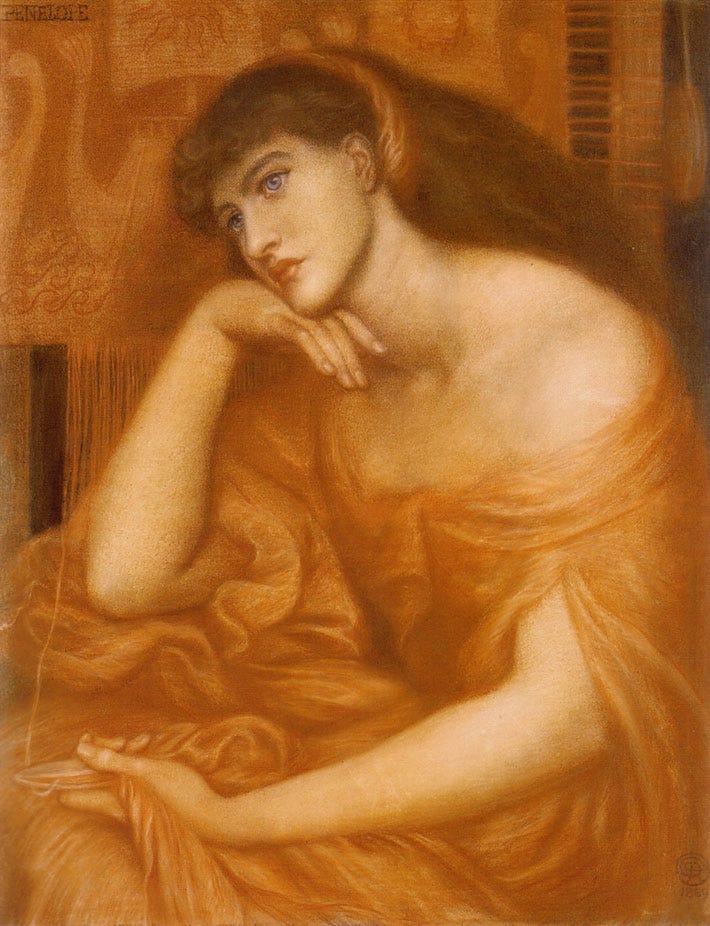
Dear Classical Wisdom Member,
One of the most remarkable aspects of Homer’s epics is that despite being the topic of discussion, debate and thoughtful conversation for millennia, there is still so much to consider!
What a gift to have such a wonder remain amongst us.
While there is plenty of fascinating themes to delve into (indeed many a noble soul has devoted their life to the contemplation of these great works), one question always lingers:
Did Penelope betray Odysseus? Why did she set up the competition in the first place?
In today’s article, Ben Potter explores the role of Penelope - and how we should really view her, below.
In fact, this comes our Classical Wisdom Litterae dedicated to the world of Homer, which Members can find after the article. In the meantime, you can enjoy a fun excerpt from the Classical Wisdom Litterae magazine here:
Oh! And I have some exciting news that I’ll be able to share with you shortly… but let’s just say, if you are interested in searching for Homer, watch this space.
All the best,
Anya Leonard
Founder and Director
Classical Wisdom
P.S. If you haven’t already joined our Classical Wisdom Ranks, there is no time like the present to commit to wisdom, learning, and the love of the ancient world:
The Penelope Paradigm
By Ben Potter
If Jackie Kennedy had lived in the Ancient world, her name would almost certainly be Penelope.
That’s because Penelope — Odysseus’ wife — is the embodiment of Ancient Greek womanly perfection, being both the ideal mother and the loyal, loving spouse.
She is also probably the most multi-faceted, complex, intriguing, empathetic and humane character to appear anywhere in the annals of Homer.
And in stark contrast to the anti-heroine of the Iliad, Helen, Penelope accomplishes this without resort to any sort of selfish, self-satisfied, capricious or preening manner.
On the contrary, Penelope conducts herself at all times with decorum, dignity and an indefatigable desire to ensure that her son is safe, her household secure and her marital bed unviolated by any of the 108 Suitors who are biding their time in Odysseus’ absence. She knows very well what her marriage would mean to them: the opportunity to rule Ithaca.
Don’t be fooled by Penelope’s tranquility. Her un-Helen-like behavior is not for lack of personality. She in no way found wanting when it comes to feminine charm and sexual appeal.
Her beauty is a constant source of comment throughout the Odyssey, for one thing. However, this is accomplished in a manner very distinct from that of Helen.
Penelope is not interested in flaunting her curvaceous wiles. Indeed, she herself claims that her,
“beauty and figure, were ruined by the immortals at that time when the Argives took ship for Ilion, and with them went my husband, Odysseus.”
This is clearly either false modesty or a reflection of her psychological state. The idea that she cannot admit to having any semblance of beauty – what was, traditionally, a woman’s key asset – without her husband’s presence indicates her desire to remain faithful to Odysseus in the face of growing pressure to remarry.
Moreover, it illustrates that she is somehow in a state of quasi-mourning that has presumably been going on for the past two decades of her husband’s absence.
This macabre fidelity for her absent spouse extends so far that she prays to Artemis for death so she “could meet the Odysseus I long for, even under the hateful earth.”
If it weren’t so noble, it would border on the slavish.
The idea that she would rather die than remarry implies that she believes Odysseus is already dead. Her prayer is actually one against having to go through with the instructions he left on his departure for Troy: i.e. that she should remarry when Telemachus comes of age.
This reluctant willingness to follow her “dead” husband’s instructions intensifies the idea that Penelope is a perfect wife; she is willing, even in death, to obey her spouse’s wishes, even to her own detriment.
It’s clear that, equal to fidelity, obedience is the key to what makes a good, Ancient Greek wife. So, when Penelope initiates the contest of the bow – the winner of which will win her hand in marriage – what exactly is her motive? The move arguably causes the most scholastic debate over Penelope’s personality.
Más info en https://ift.tt/7ls9onS / Tfno. & WA 607725547 Centro MENADEL (Frasco Martín) Psicología Clínica y Tradicional en Mijas. #Menadel #Psicología #Clínica #Tradicional #MijasPueblo
*No suscribimos necesariamente las opiniones o artículos aquí compartidos. No todo es lo que parece.


No hay comentarios:
Publicar un comentario